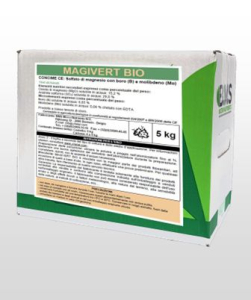You are here

Magivert Bio
 COMPOUND SOLID INORGANIC MACRONUTRIENT FERTILISER (Mg, S) fertiliser with micro-nutrients, (+15,2 + 29,8)
COMPOUND SOLID INORGANIC MACRONUTRIENT FERTILISER (Mg, S) fertiliser with micro-nutrients, (+15,2 + 29,8)
Magivert Bio is a fertilizer, containing magnesium sulphate. In addition, Magivert Bio contains boron and molybdenum in a unique formulation that ensures maximum availability of these micro-nutrients to the plant. Because of the specific selection of raw materials is the product conform the EC-regulations 834/2007 and 889/2008 and therefore authorized in organic production.
With Magivert Bio, Magnesium deficiency can be treated with foliar applications. Magivert Bio keeps the photosynthesis at a high level. The Molybdenum improves the nitrogen assimilation in the plant and the boron assures a good cell division, and thus a good quality of the flowers and the fruits. We recommend to treat preventively, or when the first symptoms appear. Suitable for all crops.
Do not exceed the maximum concentration of 2,5 % (= 2,5 kg Magivert Bio in 100 L water). Maximum concentration in greenhouse: 0,5 %. For foliar applications avoid high temperatures and bright sunshine.
Treat preferably during early morning or late evening.


